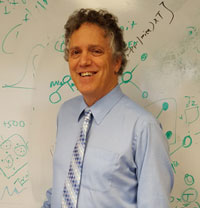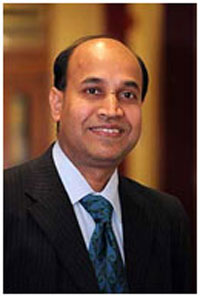
The IEEE Region 10 Symposium
Symposium Theme: Technological Innovation for Humanity
7-9 June 2019, at Kolkata, India
Explorations in Deep Learning from BIG Data to Small Data
Professor Lawrence O. Hall
Fellow IEEE
Department of Computer Science and Engineering, ENB118
University of South Florida
4202 E. Fowler Ave.
Tampa, FL. 33620-9951
lohall@mail.usf.edu
Fellow IEEE
Department of Computer Science and Engineering, ENB118
University of South Florida
4202 E. Fowler Ave.
Tampa, FL. 33620-9951
lohall@mail.usf.edu

Abstract:
This talk will cover Deep Learning at two extremes. The first is when you have more data than can be utilized even with hundreds of gigabytes of memory and GPU’s. The second is when you have a set of images, ideal for Deep Learning, but the data set is quite small. The talk will address the problem of potentially big imbalance with big data. Some approaches to augmenting small data sets and shrinking deep networks while preserving their ability to extract features will be discussed. Domain examples from predicting types of events on Github and Reddit as well as medical image examples will be covered. Pitfalls and roads to success will be illustrated.
Biography:
Lawrence O. Hall is a Distinguished University Professor in the Department of Computer Science
and Engineering at University of South Florida. He served as Dept. Chair from 2008-2015. In the
Fall of 2015 he was the Melchor Visiting Professor in the Department of Computer Science and
Engineering and Distinguished Fellow of the Notre Dame Institute for Advanced Study at the
University of Notre Dame. He received his Ph.D. in Computer Science from the Florida State
University in 1986 and a B.S. in Applied Mathematics from the Florida Institute of Technology in
1980. He is a fellow of the IEEE. He is a fellow of the AAAS, IAPR and the American Institute
for Medical and Biomedical Engineering. He is a member of the National Academy of Inventors.
He received the Norbert Wiener award in 2012 from the IEEE SMC Society. He received the
Joseph G. Wohl award in 2017 from the IEEE SMC Society. He was named the 2017 Theodore
and Venette Askounes-Ashford Distinguished Scholar Award winner at USF. His research interests
lie in distributed machine learning, extreme data mining, bioinformatics, pattern recognition and
integrating AI into image processing. The exploitation of imprecision with the use of fuzzy logic in
pattern recognition, AI and learning is a research theme. He has done research on fuzzy clustering,
deep learning in medical imaging, scalable clustering and semi-supervised learning with clustering.
He has authored or co-authored over 85 publications in journals, as well as many conference papers
and book chapters. He has received over $5.3M in research funding from agencies such as the
National Science Foundation, National Institutes of Health, Department of Energy (DOE), NASA,
DARPA, etc.
He is a past president of NAFIPS. The former vice president for membership of the SMC society. He was the President of the IEEE Systems, Man and Cybernetics society for 2006-7. He was the Editor-In-Chief of the IEEE Transactions on Systems, Man and Cybernetics, Part B, 2002- 05. He served as the first Vice President for Publications of the IEEE Biometrics Council. He is currently on the IEEE Publications Services and Products Board and chairs its Finance Committee. He is a member of the IEEE Finance committee. He is a past member of the IEEE Periodicals Committee and the IEEE periodicals review and advisory committee. He is on the Editorial board of IEEE Access, an Associate Editor for the International Journal of Intelligent Data Analysis, the International Journal of Pattern Recognition and Artificial Intelligence and International Journal of Approximate Reasoning.
He is a past president of NAFIPS. The former vice president for membership of the SMC society. He was the President of the IEEE Systems, Man and Cybernetics society for 2006-7. He was the Editor-In-Chief of the IEEE Transactions on Systems, Man and Cybernetics, Part B, 2002- 05. He served as the first Vice President for Publications of the IEEE Biometrics Council. He is currently on the IEEE Publications Services and Products Board and chairs its Finance Committee. He is a member of the IEEE Finance committee. He is a past member of the IEEE Periodicals Committee and the IEEE periodicals review and advisory committee. He is on the Editorial board of IEEE Access, an Associate Editor for the International Journal of Intelligent Data Analysis, the International Journal of Pattern Recognition and Artificial Intelligence and International Journal of Approximate Reasoning.
IoT Based Health, Home Management and Smart City
Prof. Subhas Chandra Mukhopadhyay
FIEEE (USA), FIEE (UK), FIETE (India)
Distinguished Lecturer - IEEE Sensors Council
School of Engineering
Macquarie University, NSW 2109
Email: Subhas.Mukhopadhyay@mq.edu.au
FIEEE (USA), FIEE (UK), FIETE (India)
Distinguished Lecturer - IEEE Sensors Council
School of Engineering
Macquarie University, NSW 2109
Email: Subhas.Mukhopadhyay@mq.edu.au

Abstract:
The advancements in electronics, embedded controllers, smart communicating devices as well as the progress towards a better informed, knowledge based society has increased the demand for small size, affordable sensors that allow accurate and reliable data recording, processing, storage and communication. This led to the paradigm known as Internet of Things (IoT) in which Smart Sensor Nodes are most important elements.
The seminar will present research activities on development of Smart sensors and IoT based system towards managing our health and home in a better way. A holistic view of IoT based health monitoring of an individual and smart sensor for early detection of osteoporosis will be presented. The research activities on current smart city project funded by Australian government on Pedestrian counting will be shared.
The seminar will present research activities on development of Smart sensors and IoT based system towards managing our health and home in a better way. A holistic view of IoT based health monitoring of an individual and smart sensor for early detection of osteoporosis will be presented. The research activities on current smart city project funded by Australian government on Pedestrian counting will be shared.
Biography:
Subhas holds a B.E.E. (gold medallist), M.E.E., Ph.D. (India) and Doctor of Engineering (Japan). He has over 29 years of teaching, industrial and research experience.
Currently he is working as a Professor of Mechanical/Electronics Engineering, Macquarie University, Australia and is Discipline Leader of the Mechatronics Engineering Degree Programme. Before joining Macquarie he worked as Professor of Sensing Technology, Massey University, New Zealand. His fields of interest include Smart Sensors and sensing technology, instrumentation techniques, wireless sensors and network, numerical field calculation, electromagnetics etc. He has supervised over 40 postgraduate students and over 100 Honours students. He has examined over 50 postgraduate theses.
He has published over 450 papers in different international journals and conference proceedings, written seven books and forty book chapters and edited seventeen conference proceedings. He has also edited thirty books with Springer-Verlag and twentytwojournal special issues. He has organized over 20 international conferences as either General Chairs/co-chairs or Technical Programme Chair. He will organize the IEEE Sensors Conference 2021 in Sydney, Australia. He has delivered 319 presentations including keynote, invited, tutorial and special lectures. He is a Fellow of IEEE (USA), a Fellow of IET (UK), a Fellow of IETE (India), a Topical Editor of IEEE Sensors journal, and an associate editor of IEEE Transactions on Instrumentation and Measurements. He is a Distinguished Lecturer of the IEEE Sensors Council from 2017 to 2019. He is the Founding chair of IEEE IMS NSW chapter.
Currently he is working as a Professor of Mechanical/Electronics Engineering, Macquarie University, Australia and is Discipline Leader of the Mechatronics Engineering Degree Programme. Before joining Macquarie he worked as Professor of Sensing Technology, Massey University, New Zealand. His fields of interest include Smart Sensors and sensing technology, instrumentation techniques, wireless sensors and network, numerical field calculation, electromagnetics etc. He has supervised over 40 postgraduate students and over 100 Honours students. He has examined over 50 postgraduate theses.
He has published over 450 papers in different international journals and conference proceedings, written seven books and forty book chapters and edited seventeen conference proceedings. He has also edited thirty books with Springer-Verlag and twentytwojournal special issues. He has organized over 20 international conferences as either General Chairs/co-chairs or Technical Programme Chair. He will organize the IEEE Sensors Conference 2021 in Sydney, Australia. He has delivered 319 presentations including keynote, invited, tutorial and special lectures. He is a Fellow of IEEE (USA), a Fellow of IET (UK), a Fellow of IETE (India), a Topical Editor of IEEE Sensors journal, and an associate editor of IEEE Transactions on Instrumentation and Measurements. He is a Distinguished Lecturer of the IEEE Sensors Council from 2017 to 2019. He is the Founding chair of IEEE IMS NSW chapter.
More details can be available at - https://web.science.mq.edu.au/directory/listing/person.htm?id=smukhopa